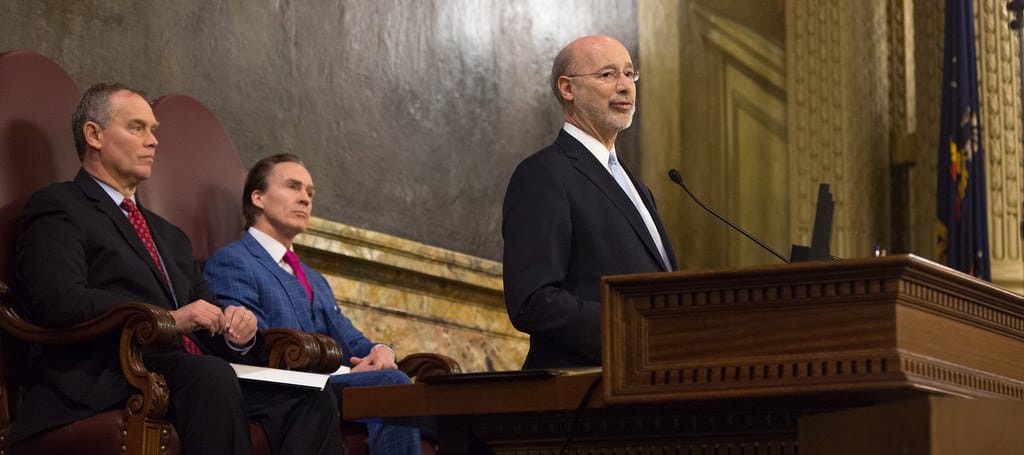
Gov. Wolf delivers his 2018-19 budget address in Harrisburg, with Lt. Gov. Stack and House Speaker Turzai seated behind him (via Flickr/GovernorTomWolf)
On Feb. 6, Gov. Wolf addressed state legislators and Pennsylvanians, announcing his priorities for our commonwealth for the fiscal year starting July 1, 2018.
We’ve gone through his 2018-19 budget and we’re happy with many of the documented plans to address poverty. We’re particularly pleased with Gov. Wolf’s emphasis on supporting workers through raising the minimum wage, mandating paid sick leave, and increasing funding for high-quality universal child care. (Scroll down for key excerpts.)
Investing in these programs will help many, many Pennsylvanians.
The state minimum wage must finally be raised to compete with Pennsylvania’s neighbors. Doing so will help grow the economy and support working families, with no negative effect on employment. And hundreds of millions of dollars in savings would come from workers no longer needing government assistance.
It’s time legislators prioritize the hundreds of thousands of Pennsylvanians who struggle every day to make ends meet. Giving them a boost will lift up everyone in Pa.
We sincerely hope that our state House leaders are finally able to put partisanship and their personal fundraising goals aside to support common sense policies that will enrich our whole commonwealth, like an increase to the minimum wage and the shale tax, and closing corporate tax loopholes.
Our concerns with Wolf’s budget
A significant portion of the funding for the Temporary Assistance for Needy Families (TANF/”cash assistance”) cash grant is being reduced and redistributed to cover child care subsidies. Some of this redistribution makes sense because TANF rolls have been declining while the cost of child care continues to increase. But this seems to continue a trend of using TANF funding to support services for those who are not enrolled in TANF. That funding should be used to support families who are in deep poverty and help them move into living-wage jobs.
The cash grant for recipients of cash assistance hasn’t changed since 1990; for a family of three in Allegheny County it is $403 a month. The cash grant isn’t just the benefit amount; it is also sets the income limit for enrolling in the program.

The opulent House of Representatives chamber in the Pa. Capitol Building where Gov. Wolf delivered his 2018-19 budget address (via Flickr/GovernorTomWolf)
TANF is now only serving 29 out of every 100 families living in poverty, and only half of families in deep poverty. At the current enrollment rate of roughly 135,000 recipients in the state, the amount the governor budgets per person is less than a meager $1,600 for the whole year.
Instead of reducing the dollar amount budgeted for cash grants by 28%, Gov. Wolf should propose using that money to bolster the TANF program by 1) allowing TANF recipients to earn more money before losing benefits, 2) improving skills-training programs, or 3) simply increasing the cash grant so that families who are meeting the TANF work requirement have more support. But instead of focusing TANF dollars on fixing TANF, that money is being used for a different priority.
Our state budget shouldn’t be about pitting families in deep poverty against families who are just above the poverty line but are still scraping by – both deserve support. But with Pennsylvania has an ongoing problem of robbing Peter to pay Paul, when Peter wasn’t getting enough as is.
Let’s hope we avoid another state budget cycle like those of recent years. We hope our state legislative leaders greet Gov. Wolf’s budget with a commitment to bipartisanship and to meeting the needs of all Pennsylvanians.
They must not, as years prior, dismiss those needs out of hand, disparage those in need, or use smoke and mirrors accounting tricks to balance the budget without any real long-term vision. They must have the hard discussion about how to pay for the basic needs and future growth of our commonwealth.
Here are our favorite excerpts from Gov. Wolf’s budget (underlining is ours):
Raising Pennsylvania’s Competitiveness by Increasing the Minimum Wage
Governor Wolf remains committed to increasing the minimum wage to $12 per hour for Pennsylvania workers in 2018. Thirty-two states and territories, including all neighboring states, now have higher minimum wage levels than Pennsylvania. Nearly 10 years after Pennsylvania’s minimum wage was last increased, the cost of living has continued to rise, reducing the purchasing power of minimum-wage workers.
Pennsylvania workers earning the minimum wage must have the ability to afford basic family sustaining necessities – housing, groceries, transportation and child care – that enable them to avoid poverty and be productive workers. In fact, in 2018 a $12 per hour minimum wage would reduce net entitlement costs for DHS programs by an estimated $101 million annually, even after accounting for increased wages for direct care and child care workers. Net federal savings would be substantially larger exceeding $600 million annually.”
Aligning Pennsylvania workplace standards with today’s modern workforce and social realities
Wage inequity across genders perpetuates the cycle of poverty by reducing opportunities for women to contribute to family income and overall economic development of their communities. By working to close the gender wage gap, the administration affirms its commitment to empower women. Pennsylvania’s 50-year-old Equal Pay Law must be modernized to address discriminatory pay, hiring, and employment practices that artificially and unnecessarily perpetuate gender pay gaps.
The administration is committed to working with General Assembly to create opportunities for parents, women, and caregivers to address the needs of their families without facing negative repercussions in the workplace by guaranteeing earned sick leave. In businesses with 25 or more employees, allowing workers to earn one hour of leave for every 40 hours worked after a 90-day employment period, would enhance productivity and retention. In particular, this will increase opportunities for women and low-income workers who may have less flexibility and therefore are often forced to choose between caring for themselves and their loved ones or earning a paycheck.”
Providing more children access to high-quality child care
The 2018-19 Budget invests $25 million in state funds, matched with $5 million in federal funds, to expand access to high-quality child care. These investments allow parents to balance working and raising their families. This investment in high-quality child care will support low-income women and families in Pennsylvania struggling to stay in the workforce due to costly child care. Parents, but most often women, must frequently choose between joining or rejoining the workforce after the birth of a child or sending their children to low-quality child care providers. By increasing access to high-quality child care and providing tiered reimbursement for child care providers to incentivize quality care, women and families will be able to better balance working while raising their families.”




No comments yet.